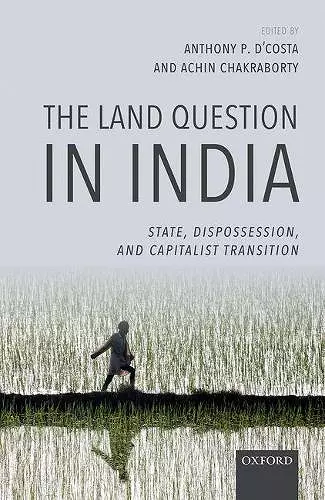The Land Question in India
State, Dispossession, and Capitalist Transition
Anthony P D'Costa editor Achin Chakraborty editor
Format:Hardback
Publisher:Oxford University Press
Published:13th Apr '17
Currently unavailable, and unfortunately no date known when it will be back

This volume takes a fresh look at the land question in India. Instead of re-engaging in the rich transition debate in which the transformation of agriculture is seen as a necessary historical step to usher in dynamic capitalist (or socialist) development, this collection critically examines the centrality of land in contemporary development discourse in India. Consequently, the focus is on the role of the state in pushing a process of dispossession of peasants through direct expropriation for developmental purposes such as acquisition of land by (local) states for infrastructure development and to support accumulation strategies of private business through industrialization. Land in India is sought for non-agricultural purposes such as purchasing land to reduce risk and real estate development. Land is also central to tribal communities (adivasis), whose livelihoods depend on it and on a moral economy that is independent of any price-driven markets. Adivasis tend to hold on to such property, not as individual owners for profit, but for collective security and to protect a way of life. Thus land, notwithstanding its role in the accumulation process, has been, and continues to be, a turbulent arena in which classes, castes, and communities are in conflict with each other, with the state, and with capital, jockeying to determine the terms and conditions of land transactions or their prevention, through both market and non-market mechanisms. The volume goes beyond the traditional political economy of the agrarian transition question, and deals with, inter alia, distributional conflicts arising from acquisition of land by the state for capital accumulation on the one hand and its commodification on the other. It provides new analytical insights into the land acquisition processes, their legal-institutional and ethical implications, and the multifaceted regional diversity of acquisition experiences in India.
This book offers a rich fare for all students of social change not only in India but also for the majority of developing countries in the world. It provides theoretical perspectives on Marx's idea of primary accumulation, which is another name for acquisition by dispossessionwhich is an ongoing process. The authors provide theoretical insights into why in most developing countries, including India, this process does not lead to a transition to a dynamic capitalist development. All the chapters are based on hard empirical data on the means of coercion, including legal sleights of hand, used by the state in favour of capital. * Professor Emeritus Amiya Kumar Bagchi, Institute of Development Studies, Kolkata, India *
The distribution of landownership, tenancy arrangements, and the marketable surplus of agricultural products have long been considered key elements in understanding the trajectory of development in low-income countries. This view is challenged, however, in this important new book. The contributors argue that land is central to economic and political change and the distribution of income and wealth in India, but it is no longer central to agricultural development. The book thus raises important issues about structural change and economic transition in India. It deserves to be widely read. * Professor Emeritus Keith Griffin, Department of Economics, University of California, Riverside, USA *
Collectively, the authors of these diverse case studies provide thoughtful perspectives, incisive insights and empirical analyses of perhaps the most vital single dimension of development processes and policies in the contemporary Indian neo-liberal accumulation regime: control over land. The studies convincingly triangulate the modus operandi of the logic and forms of dispossession and predation by capital, rightly emphasising the crucial catalyzing framework provided by instrumental legal and political interventions by the state acting as a de facto proxy for capital at various levels of the economy and polity. The editors are to be thanked for bringing together this significant intellectual intervention which will be welcomed both by the specialist researcher as well as the engaged lay reader. * Professor Emeritus Ashwani Saith, International Institute of Social Studies, The Hague, The Netherlands *
ISBN: 9780198792444
Dimensions: 241mm x 180mm x 28mm
Weight: 662g
358 pages